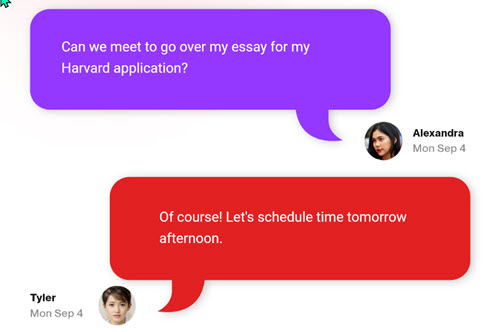NEW YORK— AtomicMind, an education technology company that offers families a boutique coaching experience in the increasingly competitive college admissions landscape, today announced the launch of a unique technology platform. The new offering provides a comprehensive and personalized college application experience by combining hands-on expert guidance from dedicated advisors with robust virtual task management, communication and feedback tools.
The platform was designed by MIT and Harvard graduates using best practices identified over the course of their 40+ years of combined experience helping students get into top colleges. It gives college applicants the benefits of enhanced feedback and collaboration with a team of experts including strategists, writing coaches and former admissions staff members from elite colleges such as Harvard, Yale, Princeton, Columbia, Brown, MIT and Stanford. The AtomicMind platform addresses every aspect of the admissions process, from crafting compelling essays to mastering interviews to refining activity and college lists. The technology includes tools for keeping track of important deadlines and documents, while offering applicants key insights into what each college admissions committee is looking for. With the platform, a greater number of students will have access to the best resources regardless of where they live.
“The new AtomicMind platform offers families access to the tools and experts needed to navigate the increasingly high standards of the elite college admissions process,” said Leelila Strogov, the founder and CEO of AtomicMind. “The platform aims to maximize college acceptance rates by helping students more effectively build college lists, create tailored applications and stay organized. It also provides parents with an opportunity to monitor the progress of their student’s college applications. This spares busy applicants the extra stress of having to provide updates to their parents or the feeling that they are being interrogated.”
Competition for admission to top colleges is fiercer than ever. Applications rose by 21.3% between the 2019-2020 and the 2021-2022 admissions cycles, according to a March 2022 Common Application report. Harvard, Yale and Brown reported record low acceptance rates, with Harvard’s falling to 3.19%, the lowest since it was founded.
AtomicMind’s platform provides structure to the college application process that facilitates increased student engagement, efficiency, accountability and quality. Highlights of the platform include:
● A college list-building section that enables students and their advisors to more effectively track and discuss which colleges students are considering, making it easier to develop the optimal Early Action, Early Decision and Regular Decision strategies.
● A task management system that provides easy and efficient tracking of – and communication between – students and advisors about every step of the application process.
● Storage of all essential documents and information, including application essay drafts, extracurricular activity lists and school transcripts.
● Its ability to serve as a hub for actionable feedback from a dedicated team of experts including strategists, writing coaches and interview coaches.
● The ability to provide students with ongoing evaluations and recommendations on how to improve their candidacy, leveraging input from former admissions committee staff members.
About AtomicMind
AtomicMind is an education technology company offering families a boutique coaching experience that prepares students to become “wow candidates” in the increasingly competitive college admissions landscape. A curated team of strategic advisors, tutors and coaches engages each student to identify their individual “zone of genius,” connecting what excites them with what can be showcased through the right mix of 427 high-impact opportunities. This immersive AtomicMind experience is enabled by a technology platform that keeps students organized and on track with measurement, accountability and strategic decision-making. Founded by MIT and Harvard graduates with 40+ years of elite admissions experience, AtomicMind is trusted by families internationally for getting 99% of students into one or more of their three, top-choice schools – all while reducing family tension inherent in the admissions process. For more information, please visit www.atomicmind.com.
- Educators Honored with YouScience® Innovative Educator Award - April 25, 2024
- CIESC Member Schools Gain Access to Metrasens Ultra Weapons Detection Systems Through New Partnership - April 24, 2024
- SchoolStatus Launches SchoolStatus Boost, an Innovative Educator Development Solution for Enhanced Teacher Growth and Development - April 22, 2024


